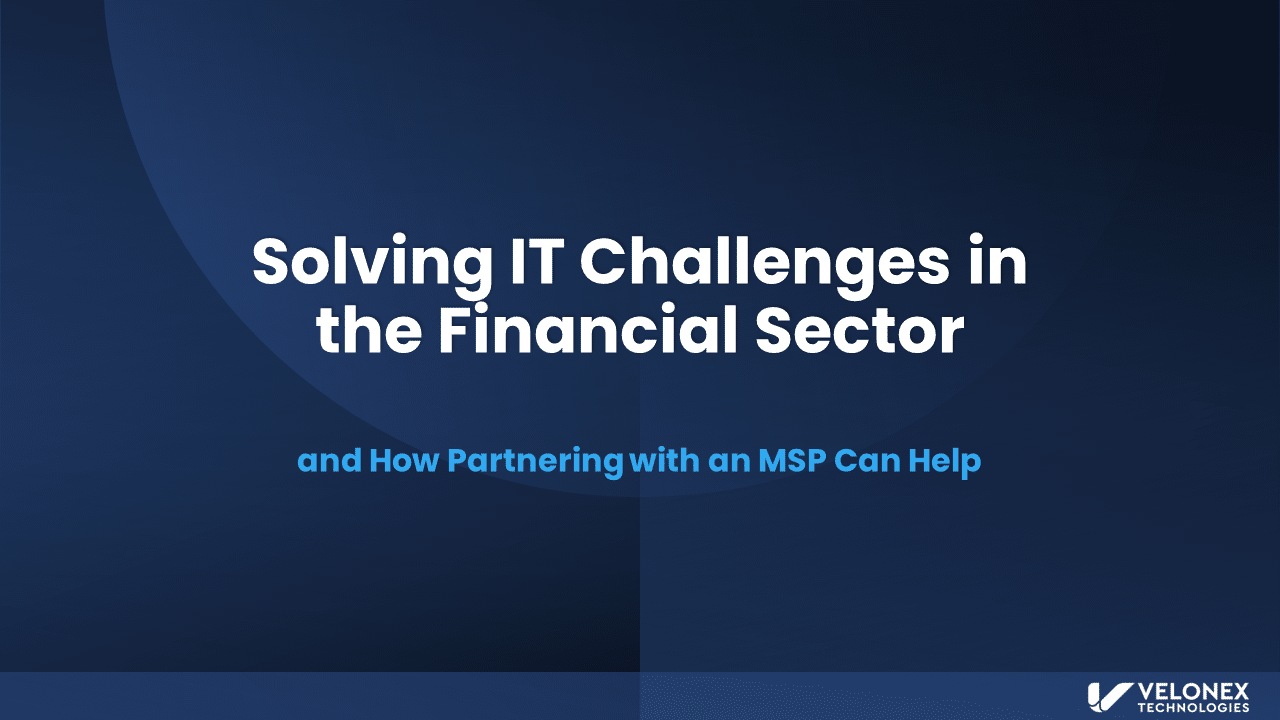As part of the financial sector, you are likely to encounter common IT challenges within the financial industry. These challenges can significantly impact your business operations, security, and competitiveness. Partnering with Managed Service Providers (MSPs) can be instrumental in effectively addressing these challenges, as they bring their expertise and experience to the table.
Some of the key IT challenges, solutions, and how partnering with an MSP can help with each challenge.
Data Security and Compliance
Protecting sensitive financial data from cyber threats and ensuring compliance with industry regulations (such as GDPR, HIPAA, or regional financial regulations) is a top concern. Data breaches can lead to significant financial and reputational damage.
Solution: Implement robust cybersecurity measures, including firewalls, intrusion detection systems, and encryption.
MSP Role: MSPs can provide monitoring, threat detection, and incident response services, ensuring that your data remains secure. They can also help you navigate complex compliance requirements by implementing necessary controls and conducting compliance assessments.
Cybersecurity
Staying ahead of evolving cybersecurity threats, including ransomware, phishing attacks, and data breaches, is a continuous challenge. Implementing robust security measures and training employees to recognize and mitigate security risks is essential.
Solution: Conduct regular security assessments, employee training, and penetration testing.
MSP Role: MSPs can perform security assessments and testing to identify vulnerabilities, and they can offer training to your staff to recognize and mitigate security risks. They can also implement advanced security solutions systems.
Technology Infrastructure
Maintaining a reliable and scalable technology infrastructure that can handle the increasing demand for digital services, including high-speed trading, online banking, and customer data management, is a constant concern.
Solution: Adopt scalable, cloud-based solutions for flexibility and cost-efficiency.
MSP Role: MSPs can manage your cloud infrastructure, ensuring it’s secure, well-maintained, and can scale with your business growth. They can also provide disaster recovery solutions in the cloud to ensure business continuity.
Digital Transformation
Embracing digital transformation and ensuring that your IT systems and processes are up-to-date and competitive with industry trends. This includes adopting modern technologies like cloud computing, AI, and blockchain to improve efficiency and customer experience.
Solution: Invest in modern technologies like AI and blockchain to enhance services and customer experience.
MSP Role: MSPs can assist in the selection, implementation, and management of these technologies. They offer expertise in integrating new technologies with your existing systems, ensuring a smooth transition
IT Talent Acquisition and Retention
Attracting and retaining skilled IT professionals who are well-versed in finance-specific technologies and security measures can be challenging, especially in a competitive job market.
Solution: Partner with MSPs to access a team of skilled IT professionals.
MSP Role: MSPs have a pool of specialized IT talent. They can provide you with experienced professionals who can complement your in-house team or even manage your IT functions entirely, reducing the burden of recruitment and retention.
Regulatory Changes
Adapting to changing regulatory requirements and ensuring that your IT systems can quickly and cost-effectively implement new compliance measures.
Solution: Stay informed about regulatory changes and adapt systems accordingly.
MSP Role: MSPs keep abreast of regulatory changes and can adjust your IT systems and processes to remain compliant. They can also help with compliance audits.
Disaster Recovery and Business Continuity
Planning for and mitigating the impact of disasters, including data center failures, cyberattacks, or natural disasters, on your business operations.
Solution: Develop a comprehensive disaster recovery plan.
MSP Role: MSPs can design, implement, and manage disaster recovery solutions, including data backups, offsite storage, and failover systems to minimize downtime during disasters
Cost Management
Balancing the need for IT investments with cost control. Optimizing IT spending to ensure a positive return on investment is crucial for profitability.
Solution: Optimize IT spending by aligning it with business objectives.
MSP Role: MSPs can provide cost-effective IT solutions, helping you balance your IT investments and achieve a positive ROI.
Legacy Systems
Managing and potentially replacing outdated legacy systems that may no longer meet the needs of a modern financial institution.
Solution: Optimize IT spending by aligning it with business objectives.
MSP Role: MSPs can provide cost-effective IT solutions, helping you balance your IT investments and achieve a positive ROI.
Innovation
Encouraging innovation in IT to remain competitive. Exploring emerging technologies like fintech partnerships, AI-driven financial services, and blockchain applications.
Solution: Plan for the gradual replacement of outdated systems.
MSP Role: MSPs can assist in the transition by ensuring data migration, minimizing disruption, and supporting the integration of new systems with existing infrastructure.
Partnering with an MSP provides financial companies with expert guidance, access to specialized skills, and the flexibility to adapt to changing IT landscapes, ultimately addressing these IT challenges more effectively. By leveraging the expertise of MSPs, financial companies can focus on their core business functions while knowing that their IT infrastructure is secure, compliant, and primed for growth and innovation.
If you’re in search of reliable IT solutions to address your finance industry challenges, don’t hesitate to reach out to us. At Velonex Technologies, we have a proven track record of assisting finance clients with their IT needs. Contact us today to see how we can support your business.
